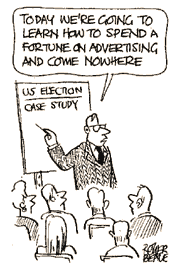Political marketing has lessons for business schools
Roula Khalaf, Editor of the FT, selects her favourite stories in this weekly newsletter.
Few would argue that political marketing is big business in the US. Last week’s political battle between President Barack Obama and Governor Mitt Romney captured the world’s attention. This was partly because it was a close race, but it was also because it occupied so much airtime on world news programmes and paid advertisements in the US.
Political marketing has hit the big time. Mr Obama and Mr Romney and their respective super-Pacs (political action committees) have each spent more than $1bn on the 2012 US presidential election campaign. What’s more, all this was spent in 11 months. How many other businesses spend $1bn on marketing in one year?
It shouldn’t surprise us therefore, given the size of these presidential campaign expenditures, that the individuals who run these campaigns – the political marketers – have one or two tricks up their sleeves that the more conventional public relations officers might not. Perhaps political marketing has something to teach business schools.
You might think that these lessons would come from the much-vaunted micro-targeting that both campaigns have been conducting, where highly customised emails are sent to digitally savvy would-be voters, based on a treasure trove of carefully gleaned personal information. What about both campaigns’ use of social media to motivate the Twitterati? Or the use of Facebook for fundraising? Of course, the campaigns (both have either a digital director or a chief digital strategist) have been good at these things but then so are many companies. And ultimately social media, while useful, is not as influential on voting intentions as paid-for advertising, at least for the moment.
In fact, the lessons lie in the multibillion-dollar sector of political marketing and these are lessons that business schools could do well to pass on to their students.

Political marketing involves the marketing of ideology as well as political candidates. The most persuasive political advertisement of all time is the “daisy spot” – Lyndon B. Johnson’s television advertising campaign against Barry Goldwater in the 1964 American presidential election, portraying a young girl picking petals off a daisy in time to Goldwater’s nuclear countdown voiceover. The melodramatic spot, shown only once but repeated endlessly in media commentary, typecast Goldwater as a nuclear warmonger on Vietnam policy and he never recovered. In the UK, the Conservatives’ 1979 iconic billboard campaign advertisement, designed by Saatchi & Saatchi, torpedoed the Labour party campaign with just four words: ‘Labour is not working’.
Political marketing, when it is good, has an uncanny ability to market ideology. Business schools should take note. After all, their students, many of whom will in time become managers and chief executives, will have to develop and market ideology internally, usually in the form of missions, visions and values, to gee up their constituent employees, supply-chain partners and shareholders. But increasingly, companies are also expected to stand up and promote their values externally, to other stakeholders such as government regulators, the media and even the general public. In the UK, for example, The Co-operative Bank – a highly successful niche retail banker – has long marketed itself not on its service or product range but on its ethical values.
Once, companies marketed their products based on functional attributes or brands; today companies are increasingly marketing themselves on their values – sustainability, climate change or ethical issues, for example. And to do this, companies need to understand and research what value systems to promote and how to tie into their customer-stakeholder constituents.
There is also another corporate perspective in political marketing that business schools would do well to pay attention to. In a world where business is increasingly global, businesses have become more political than ever. They are increasingly interacting with government and political parties. With huge labour forces and large tax payments at stake, these companies have a right to be consulted and to argue their case over legislative changes and business contracts that will affect their businesses.
But few business schools even offer a political marketing elective on their MBA or specialist MSc programmes. Why not? Have they been sleeping on the job? My point is that, in an increasingly political corporate world, they really should. After all, a political marketing module would be an obvious extension of the usual macroeconomics modules typically offered on most management programmes – but with one critical difference: it would not assume the political environment was uncontrollable. Instead, students would be expected to identify how they can positively affect the political environment to the benefit of specific companies, including identifying the rhetoric and the type of strategic communication campaign necessary to persuade governments or regulators to accept their companies’ ideological positions. As a consequence, management students would be much better prepared for the politics of modern-day global markets than they are at present.
The writer is director of the MSc in management and professor of political marketing at Cranfield School of Management.
Comments